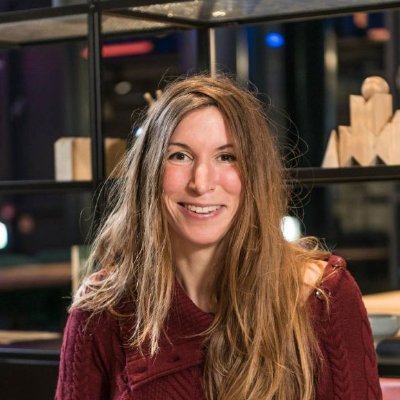How dyslexia could help humans adapt to climate change
By Helen Taylor - Posted on 31 March 2022
People with dyslexia may play a critical role in our species' collective ability to solve problems and adapt. Such abilities could be harnessed to tackle problems such as climate change, says Helen Taylor.
Insights are emerging from research on dyslexia and a new theory of human cognitive evolution called “complementary cognition” which suggests that humans evolved to specialise in different but complementary ways of processing information. It suggests that collaboration to combine these different abilities enables human groups to act as more than the sum of their complementary parts, increasing our ability to co-create, solve problems and adapt.
At the most fundamental level, this cognitive specialisation reflects the extent to which individuals are about to exploit the known versus explore the unknown. This new research proposes that people with dyslexia are specialised in exploring the unknown. Combining these cognitive specialisations may underpin our success as a species by making us exceptionally adaptive – if we collaborate. It is a system thought to have evolved through adaptation to a highly variable world over hundreds of thousands of years.
Research conducted by Professor Richard Potts, founder of the Smithsonian’s Human Origins Program, has shown that considerable environmental instability shaped the evolution of our ancestors. Consequently, we did not evolve to adapt any one particular habitat; rather we have been able to survive variability by evolving characteristics that allow us to be better at adaptation itself. These characteristics have allowed us to adapt and survive in a range of habitats.
Humans primarily adapt through culture, which involves exploring, refining and consolidating behaviours or inventions that contribute to our survival. Different cognitive specialisations contribute to this knowledge-creation process in complementary ways. Collaboration brings about high-quality solutions that would not be possible for any one individual, or group of similar individuals. This makes us interdependent, meaning that people with different abilities must collaborate effectively to adapt and solve problems successfully.
In the light of this theory, we can look at one of today's most pressing problems – climate change. To address this incredibly complex problem, we are going to need the collective power of complementary cognition. This will involve reassessing the cultural practices of our modern society – including the marginalization of people with dyslexia – that are preventing us from harnessing our full collective ability to adapt.
Dyslexia: the exploring mind
Most people, including educators, academics and policy makers, consider people with dyslexia as having a developmental disorder, reflected in having difficulty reading and writing. Yet this so-called disorder affects a large proportion (about 10-20%) of the world’s population, regardless of culture or language. Such ubiquity suggests that people with dyslexia - rather than having a disorder - in fact have an advantageous form of cognition passed on to us from our ancestors over thousands of generations.
New research shows that the brains of people with dyslexia are specialised in exploration – that is, they tend to explore the unknown rather than relying on existing knowledge. Exploration is associated with experimentation, invention and discovery, and can involve exploration for new knowledge in abstract space and time as well as in physical space. This specialisation comes at the expense of processing more detailed information, to sequence and exploit the known – which contributes towards explaining why dyslexic people have reading and writing difficulties.
Given their enhanced abilities to explore, it’s not surprising to find that people with dyslexia tend to work across disciplines, often being driven to discover and connect. Exploratory specialisation in people with dyslexia appears to manifest in higher-level strengths, such as enhanced abilities to identify the root causes of problems and see fundamental system patterns, anticipate long-term trends and invent highly original strategic or technological solutions.
With these new insights, we are only just beginning to realise that these abilities have important implications for tackling climate change and creating a more sustainable world.
How people with dyslexia could help tackle climate change
Along with their higher-level strengths, people with dyslexia have an ability to envision the future and a drive to seek new ways to adapt. This is perhaps the reason why there is such a large proportion of people working in the sustainability sector who have dyslexia. As Anthony Hobley, Co-Executive Director of the Mission Possible Partnership, puts it: "People with dyslexia are humanity’s natural systems thinkers. I am convinced that their unique abilities will have brought them into the climate change area. I believe that the human race has a small number of us who are wired to worry about the big picture and the future as part of our collective survival strategy."
Despite their impressive cognitive abilities, people with dyslexia are often culturally side-lined and stigmatised from an early age due to their literacy difficulties, with their insights often not taken seriously. These types of culturally-embedded practices could unintentionally be undermining our ability to find and act upon innovative and creative solutions to major societal problems including climate change.
Embracing complementary cognition
Imagine what we could achieve if we redesigned our existing systems. Complementary cognition could be a framework commonly used to ensure groups collaborate successfully, enabling us to adapt and solve sustainability challenges more quickly and effectively.
Within this framework, people would typically be recruited into so-called ‘adaptive groups’; that is, teams consisting of people with highly complementary cognitive abilities, allowing them to collaborate effectively and produce the best possible ideas and solutions. The exploratory specialisation we see with dyslexia would not be viewed as a disorder but rather an important ability that is valued and nurtured from day one. Children would be encouraged to learn through exploration – that is, to figure things out, discover and innovate in addition to learning from existing knowledge.
The innovative problem-solving that emerges from this highly cooperative system is likely to greatly enhance and even accelerate our ability to create adaptive and sustainable societies around the world.
A change for the better
As a completely new area of research and approach to adapting to climate change, there is still a lot we are trying to work out, such as how complementary cognition can best inform new business practices and how it can be applied effectively in education. However, what is certain is the need to adapt faster. A key step towards this is to modify the dominant cultural values of our modern society. By emphasising collaboration over competition, and embracing different ways of thinking, we can harness the collective ability of humankind to adapt and create a sustainable society.










